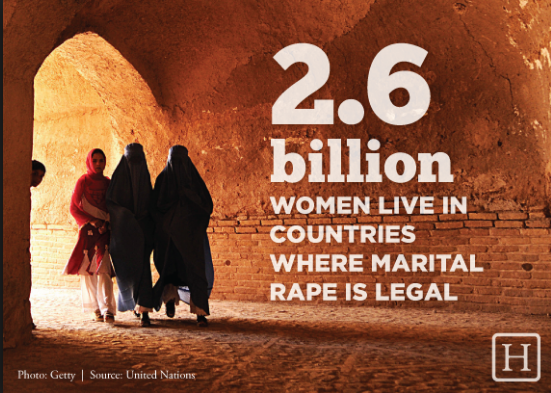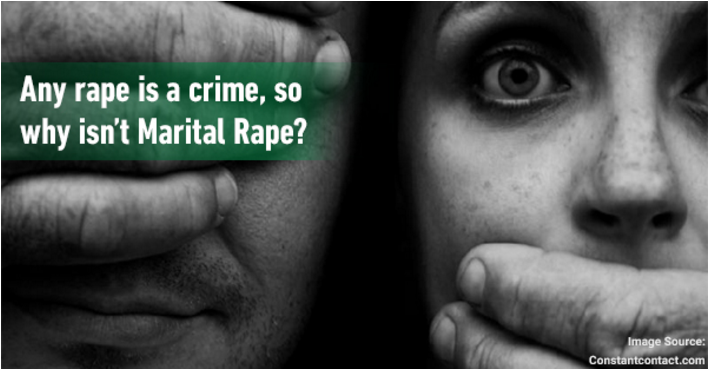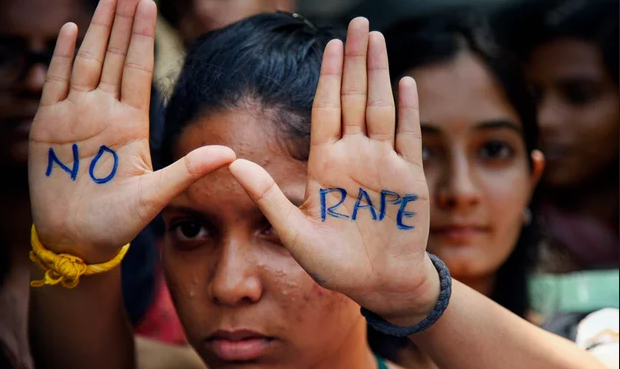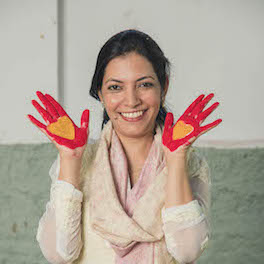- CATEGORY: OPERATION PEACEMAKER
Why it’s time India criminalised marital rape
It is time to join the 104 countries around the world that allow marital rape to be prosecuted under the law and give the wives of India the right to live a life free from abuse and fear.
In one of my cases, I counselled an elderly couple who were addressing the violence in their household after nearly 35 years of marriage. With two grown children out of the house, the wife finally decided she was going to pursue peace. She had multiple health issues, some due to years of physical abuse that her now tired body gave evidence to. Her husband, while giving me his list of complaints against his elderly wife (his justifications for abuse), told me that it was her responsibility to have sex with him at least at night if not during the day as well.

In recent months the criminalisation of marital rape has been a topic of much debate in India. As Program Manager of Operation PeaceMaker I have first hand experience of the negative effects that this humiliating and degrading abuse has on women of all ages and walks of life.
For the second time in less than five years government appointed reports have slammed the legislature for failing to criminalise or even recognise marital rape.
Most recently the ‘Status of Women in India’ report, said, “The Act (Criminal Laws Amendment Act 2013) is silent on the issues of marital rape, making it an offence only in cases where the wife is under 15 years of age. The Verma Committee [lead by one of India’s most eminent male thought leaders for women empowerment] has, however recommended that marital rape be made an offence irrespective of the age of the wife. This shows the legislature’s failure to appreciate the growing menace of this crime wherein the victim has to suffer on a daily basis.”
The Panel also noted that that the United Nations Committee on Elimination of Discrimination against Women (CEDAW) had observed that India should amend its laws to “reflect the realities of sexual abuse experienced by women and to remove the exception of marital rape…”

Currently, the only recourse for women experiencing marital rape is through civil remedies provided under the Protection of Women from Domestic Violence Act 2005 – which does not provide criminal sanctions, which are necessary to adequately punish perpetrators of such a serious and damaging act.
While Maneka Gandhi, Union Minister for Women and Child Development has suggest that the government will look into amending the necessary laws it is important to note that only last month she claimed that India is not ready to criminalise marital rape due to a number of social factors; including poverty, illiteracy and religious beliefs. She also suggests there is insufficient evidence of marital rape occurring in India to warrant the government to consider the amendments.
Based on these comments I question Ms Gandhi’s understanding of the importance of these legal amendments. We must remember that our lawmakers have a duty to uphold and forge a path for citizen’s rights to equality and a life free from discrimination and abuse. These aren’t superfluous rights, but rights that are enshrined in our constitution and reflected in the UN Declaration on the Elimination of Violence Against Women, to which India is signatory to. I am sure that the masses would have said that India was not “ready” for one of the world’s most progressive sets of laws for the protection of women from domestic violence. Yet, in 2005, after years of advocacy by stalwarts led by Indira Jaising, Indian law set an example for its people and the world in this regard. In that moment, the purpose of the law was fulfilled to lead its people into an order that serves justice, not the unjust.
Furthermore, if as Ms Gandhi suggested, Indian society is not ready for such change, I would suggest at the very least, this warrants government attention to raise awareness amongst citizens, the police, judiciary and government officials about the need to respect a woman’s right to make decisions about her own body. In one of our cases last month a police officer refused to file a DIR (Domestic Incident Report) for our client who had just narrowly escaped from her house that was home to 16 years of daily violence including beatings and attempts to pimp her out to her husband’s friends. In the presence of our Counsellor, the policeman told her “It’s not like the abuse is happening right now. You’ve left, and it’s behind you. There’s no need to file a case.” Why is it that for a rape survivor we (theoretically) agree that she needs urgent care and action, but for a woman who’s torture happens in her own home we are so insensitive? The policeman in this case was even under a legal obligation to file the case, and to activate a process that the law dictates should only take 60 days to resolve. If officials are so insensitive to their duties under the law, how can we possibly expect any help from them when something is not acknowledged by the law?

To Ms Gandhi’s second point regarding lack of evidence to support the amendment, a recent gender study conducted by International Centre for Research on Women and United Nations Family and Population Fund in India, which shows that 1 in 3 husbands admit to forced sexual acts in their wives. Additionally, the National Family Health Survey reveals that 1 in 12 women surveyed said they had experienced sexual violence in their lifetime. More than 93% of these women said that they had been sexually abused by their current or former husband.
Sadly, this data is too often reflected in the work that I do with Operation PeaceMaker. In almost every case of domestic violence there is also sexual abuse. Everyday I meet women who have lost their right to consent, leaving them in a position of fear and powerlessness.
Instead of upholding the family unity at any cost, I ask our government to provide women with the legal framework to recognise this horrific act and to seek justice.
We like to think that sex within marriage is something partners enjoy as an act of love; that men understand that their wives’ need to feel safe to give them their bodies, and that wives understand that withholding intimacy is not a weapon of martial warfare. Yet, this is not the case for many marriages in India. I understand that it is not black and white, and proving marital rape is daunting. Yet, for women like my elderly client, the law provides no opinion, no assurance that what’s being done to her is wrong, and no recourse to indicate that she does not deserve abuse for refusing sex to a violent and controlling partner. For all she knows, the law agrees that it is her husband’s right to force her to have sex.
It is time to join the 104 countries around the world that allow marital rape to be prosecuted under the law and give the wives of India the right to live a life free from abuse and fear.






